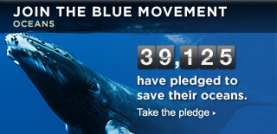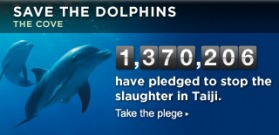|
When it comes to surfing, there is one name that dominates; Kelly Slater. Yet the nine time world champion who has recently been dubbed the number one competitive athlete across the board possesses more than the skill, grace, focus and stamina of a warrior athlete; he also shares a profound connection to his liquid arena and a deep concern for the cetacean inhabitants that reside within. I was both stoked and grateful when the often reserved Slater openly shared his reflections with me regarding the Japanese dolphin slaughter that sadly claimed yet another innocent thirteen lives earlier Monday afternoon. Spoken as a true Ocean ambassador, he writes:
"I am highly against the killings because of my affinity for oceanic creatures. I've ridden waves with countless dolphins and they are such graceful and peaceful mammals. We don't know the levels of intelligence and communications they have, we're only scratching the surface on it. I could not imagine killing something like that. "As someone who spends the majority of his time ripping perfect waves across the planet, Kelly is certainly no stranger to interacting with people's of various cultural traditions. However he makes no qualms about condemning Japan's diluted justifications for the annual dolphin slaughter and illegal commercial whaling activities, to which he refers as "a ridiculous practice and tradition." He states: "When you travel the world year 'round, you come in contact with many different cultures. You start to realize that people do things you never thought possible or necessary yet somehow make sense to them for either traditional reasons or social pressures. They are not needed as food, are potentially very unhealthy due to mercury levels, and at this point we have traversed the knowledge necessary for 'scientific purposes' of killing them.""Surfers Paddle Out", 2007 photo: Surfers for Cetaceans As part of the surfing crew that took part in the paddle out ceremony led by Dave Rastovich and Surfers for Cetaceans in 2007 that would later become a scene in the recent Academy Award winning documentary film, The Cove, I was impressed by Kelly's support of his fellow surfer's mission after lending him a copy of the film early last year. "I think it's great. Rasta's brought awareness and visibility to a lot of people around the world. The issues have been raised and can't be ignored now even more so," he told me in a follow up e-mail correspondence and even mentioned the possibility of traveling to Taiji himself to oppose the annual atrocity. Unfortunately, there is no time like the present. Earlier today, reports began flooding in from the front lines that the infamous killing coves once again shamefully ran red with cetacean blood. Up until now this year's hunting season has been substantially less active than years past, largely in part due to the collaboration of activist groups on the ground to defend the 'homeland' and from the recent outpouring of media support in Tokyo. However the fisherman of Taiji once again turned this otherwise serene coastal village into a disgraceful butcher shop as they resumed business as usual while the concerned eyes of the world continue to watch on in sheer horror and disbelief. Adds Slater: "I don't understand the need for it or the idea behind it but I do know that when the cameras are on these 'fishermen' they are not proud of the 'job' they're doing and don't want any of it to be made public. There is an inhumanity to this, as there is to war, but there is a conscience in every one of those guys who is doing it."Australian actress and passionate dolphin and whale defender Isabel Lucas, who was also part of our 2007 surfing ceremony to honor the thousands of lives lost throughout the decades and help expose this critical issue quickly chimed in when she learned of the recent reports of this year's bloodbath. She writes: It is heartbreaking to realize that the Taiji dolphin kills are still happening as we speak. Hundreds of Dolphin and whale families are being exterminated in the name of an outdated tradition and human greed. What is even harder to comprehend is that the meat is filled with heavy metal toxins and mercury poison, and is completely unfit for human consumption. We need to band together as caring human beings to end the slaughter, and protect humans from poisoned meat. I urge everyone to put pressure on the Japanese government to end this practise, and to support direct action groups such as Sea Shepherd and Save Japan Dolphins. According to Sea Shepherd Conservation Society Founder, Paul Watson, "The sea teaches us so much and it is the responsibility of surfers to communicate these teachings to humanity." In a previous interview conducted for Surfer Magazine, he further encouraged surfers to take a more active role in the protection of the world's oceans and all the marine life that reside within. He eloquently states: "Listen to the ocean, listen to the whispers in the waves and surf where your heart leads you, let the ocean speak through you and do everything within your power to protect her majesty the sea from the ignorance and arrogance of humanity. Kelly has said that the ocean has spoken to him as it has spoken to me and many others. He understands what it means to be a moanahepara -- a shepherd of the sea."Captain Paul Waton and Kelly Slater at Australian Quicksilver Pro, 2007. photo: Deborah Bassett Slater, a long time supporter of Sea Shepherd further adds: "I believe the dolphin killings are a chance for everyone to sit back and become aware of what impact their lives have on the world around them. I hope for change in a lot of things happening in my own life and in the world around me and this one is at the top. Hopefully, with enough visibility and education to the people involved, there can be a complete stop to this ridiculous practice/tradition."WHAT YOU CAN DOJoin the October 14th Annual Save Japan Dolphins demonstration in a town near you. Sign the petition at Take Part. 2 million people and growing strong. Watch the celebrity PSA here. Join the Visual Petition, an ongoing action campaign from Surfers for Cetaceans and Minds in the Waterwith over 10,000 participants including Kelly Slater and numerous other surfers and celebrity activists and concerned citizens from around the world. Check the Sea Shepherd website for up to date information from the "Cove Guardians" on the daily happenings in Taiji. Watch The Cove. Spread the word. Pass it On. Call and write your local Japanese Embassy to voice your concerns on the issues. Photo Courtesy: Noah Schutz Peaceful Warrior Ric O'Barry Speaks Out on Taiji Dolphin Slaughters- Huffington Post 9/7/102/15/2011 Environmentalists and animal rights activists around the world have been sitting on pins and needles this past week as the annual dolphin hunt that claims more than 20,000 innocent cetacean lives every year kicked off in the coastal village of Taiji, Japan on September 1st. No one is more familiar with the on-going battle to end these senseless slaughters better than Ric O'Barry. The 70-year-old former Flipper trainer turned dolphin activist and star of the recent Academy Award-winning film, The Cove, has been at the forefront of the struggle to put an end to this brutal atrocity for over four decades. Per usual, he is back on the ground campaigning with his team from Save Japan Dolphins, a long standing initiative of Earth Island Institute. However due to escalated threats of violence by right wing extremists groups, this year he finds himself rallying media support in Tokyo, rather than staking out the "little town with a big secret" that has long been the singular focus of his personal mission and life's work.
On September 2, the day after the hunts were set to begin, O'Barry and an international conglomerate of concerned citizens, delivered a petition with over 1.7 million signatures representing 155 nations to the U.S. embassy in Tokyo. "We have come to ask President Obama to get involved in this issue and ask the Japanese government to abolish this annual, anachronistic, brutal slaughter of dolphins," stated O'Barry in a recent press release. The U.S. president is expected to visit Japan in November for an annual summit of Asia-Pacific leaders. I had both the honor and privilege of working directly in the field with Ric O'Barry back in 2007 during a surfing paddle out ceremony led by Surfers for Cetaceans in conjunction with The Oceanic Preservation Society's covert filming operation of The Cove. Earlier this week, O'Barry candidly shared with me his thoughts on the current happenings in Japan in what he calls a "media blackout of the issue up until now." He states: "We have virtually every media outlet at our disposal and because of that we are reaching millions of people around the world. We have turned up the heat in Japan and turned another corner in getting positive media coverage, thwarting Japan Fisheries Agency efforts to paint us as imperialists and outsiders just bashing Japanese people. Instead, millions of people in Japan are now hearing, most for the first time, about the dolphin slaughter, precisely what the Japan Fisheries Agency has successfully covered up in this country for decades." While O'Barry and his team had initially intended to head back to the scene of the grueling bloodbath, as evidenced by the undercover footage exposed in The Cove, they decided to cancel that portion of the trip due to heavy threats from right wing pro-whaling groups within Japan. Mark Palmer, director of The Save Japan Dolphins campaign, explained in a recent e-mail correspondence: "We are not here to do confrontations with mobs; we are here to educate the people of Japan and help them overturn really bad government policy on allowing dolphins to be slaughtered and sold in markets despite the dangers of poisoning from mercury contamination." With various conflicting reports flooding in all over social media sites as to the current situation on the ground both in Tokyo and Taiji, O'barry helped to set the record straight. He reported on Saturday: "We have had 14 people on the ground for the last several days in Taiji. It is ghost town there at moment. The only bodies visible are the 11 police officers from Shingu, Kii-Katsuura, and Wakayama City. The right wing militants have abandoned the issue." Although it has been confirmed that the "hunt" is indeed under way, fishing boats boats returned empty earlier in the week. On Sunday morning, an unidentified activist from the group, Oceanic Defense, statedon their blog site the following information: "For two days now we have traveled to that Cove, and seen nothing, only to be told hours later dolphins are being held there. Yet, when we arrive, they are gone again. It's almost as though the fishermen know our movements before we do. It's frustrating to think we've traveled all this way and can do nothing to stop the bloody slaughter that happens here." Meanwhile an official from the town of Taiji released a statement to the Associated Press on opening day of the hunt, stating that "I have no idea what the foreigners' intentions are, but there is nothing unusual going on in the town. Our stance remains the same. The town will continue hunting dolphins no matter what they say." On Thursday, Japanese media reported fishermen in Taiji had captured 20 bottlenose dolphins in the secluded cove as the first catch of the season, however local fisherman would not confirm the reports to the Associated Press. "We don't want to be reported on by foreign media," he said. "This is what we do for a living. We are worn out because of the row over The Cove." According to director of The Cove, Louie Psihoyos, in a recent personal correspondence: "The mayor of Taiji celebrated the taking of 10 dolphins today. Knowing that the world was watching, the dolphin hunters selected several dolphins for marine parks and set the remaining pod members back into the wild. Last year, those dolphins would have been butchered and much of their poisoned meat sold as 'whale' meat to unsuspecting consumers. It's important that we keep vigilant -- this kind of evil cannot stand the light of day." O'Barry is quick to point out that it is not the townspeople of Taiji, but rather 26 fisherman responsible for the dolphin killings. In response to the call for a boycott from various activist groups, O'Barry told theJapan Times on Sunday that he reversely would like to "anti-boycott Japan." On the contrary, "We want people to go to Taiji, go to souvenir shops and restaurants and spend money to stimulate the economy there," noting that this approach would give the town alternative sources of revenue to selling dolphin meat." Some critics have questioned why O'Barry, certainly no stranger to risking his life continously through his dedicated activism, has not forged on with a mission to the Taiji. O'Barry responded: "The first part of our mission is to make the world aware that the annual dolphin slaughter has begun once again and to that end we have been very successful. The media is based here in Tokyo, not in Taiji. It is very difficult to get the media to travel to the remote location of Wakayama prefecture and there is really very little that we can do there. This is not a 'one size fits all' scenario and confrontation does not work here. You have to stay in the game and we are here to stay in the game until we win it." O'Barry further encourages a peaceful non-violent solution to the ordeal. "In order to effect positive change, we have to win the hearts and minds of people," he adds. "We accomplished this recently in the Solomon islands after 450 years of "tradition" -- so this strategy is clearly working." Regarding his steadfast, peaceful warrior approach to the situation, he boldly admits: "I know exactly where the 13 dolphin hunting boats are moored. I know how to sink them without being detected. And if I believed that sinking the boats would end the dolphin slaughter, I would have already done it. But it won't work. It would only work against us. Having worked on this issue for so long, I know that the Japanese media would frame the story in such a way that the 'poor fisherman' would be the victim of terrorists. The government would buy them new boats and they would be hero's. Those of us who are working inside Japan would be banned from Taiji forever." At present, O'Barry has confirmed that no dolphins have actually been slaughtered and that the fisherman have even released a pod of mothers and babies back into the wild after selecting an "attractive" few to be sold into a dreadful life of captivity via the dolphin slave trade. However, O'Barry cautions that once the cameras and protestors are gone, "business as usual" will likely resume and the fate of the dolphins will be left in the hands of the those that are willing to stay the course: "When we arrived in Taiji last September, the dolphin hunters released about 80 bottlenose dolphin after selecting several "show quality dolphin" for various zoos and aquariums. They went on to kill all other species after we left the area. It seems to me that they will do the same thing this year." While the updates continue to trickle in from those behind 'enemy' lines, it appears that the combined efforts of activist groups and passionate individuals around the world have been collectively victorious in sending a clear message to the Japanese government that the world wide community is indeed watching very carefully and that is perhaps the first step in bringing an end to the outdated, if not barbaric, practice that hides under the false guise of cultural tradition. Added Psihoyos in a recent article for Malibu Magazine's "Blue" edition: "Slavery and not allowing women to vote were once considered traditions in America, however when human rights are violated, traditions can no longer be allowed to continue. In this case, the 'tradition' is a myth perpetrated by the few that benefit from the sale of captive dolphins and a cover-up to prevent the truth about the dolphin meat that is poisoning the masses." If enough people around the world learn about this "barbaric dolphin slaughter", O'Barry is hopeful that they will take action. He writes: "We have reports from all over the world that the Japanese embassies and consulate offices are being bombarded with messages to stop the dolphin slaughter. Now we need to flood the World Association of Zoos and Aquariums (WAZA) with a message to start policing their own industry. The Taiji Whale Museum (TWM) is directly involved in these captures. TWM is a member in good standing of theJapanese Association of Zoos and Aquariums (JAZA). JAZA is a direct member of WAZA.O'Barry urges individuals and organizations to "send WAZA a strong message to expel all JAZA members -- especially the TWM -- for violating the WAZA code of ethics." O'Barry is currently on his way to address members of the Foreign Correspondents Club of Japan, of which he remains an honorary member in good standing. His new series, Blood Dolphins, directed by his son and fellow dolphin activist, Lincoln O'Barry, airs on Friday evenings at 9pm on Animal Planet. For up to date information on the situation in Taiji and to learn how you may take action to help stop the slaughter, please visit: www.savejapandolphins.org Photo courtesy: Animal Planet Faroe Islands Pilot Whale Massacre Exposed by Undercover Activist- Huffington Post, 7/29/102/15/2011 While Japan may be in the hot seat with the international community for it's annual Flipper killing-spree, recently exposed by this year's Academy Award winning film The Cove, it is certainly not the only nation guilty of gruesome cetacean massacre. Last week, The Sea Shepherd Conservation Society captured shocking and highly disturbing images of 236 pilot whales brutally slaughtered in the town of Klaksvik in the Danish Faroe Islands. Ah yes, something is indeed very rotten in Denmark.
Living incognito and posing as a Swedish film student under the alias Frederik Nilsson, Sea Shepherd's Peter Hammarstedt was alerted to the annual "grind," as referred to by the Faroese, by a broadcast over the local radio station. Without hesitation, the veteran activist quickly arrived on the scene to document the grisly bloodbath that is considered a cultural tradition and rite of passage in the tiny island group situated approximately halfway between Britain and Iceland. Hammarstedt, a Swedish native, offered his first hand knowledge on the matter earlier this week and recounted the harrowing experience that left him fleeing the seaside village once his true identity was discovered and he began to receive threats and was followed by local fisherman who recognized him for his prominent role on the hit television series, Whale Wars. "An entire pod that once swam freely through the North Atlantic has been exterminated in a single blood bath," stated Hammarstedt on the Sea Shepherd website. "Unborn babies still attached to their mothers by the umbilical chord had been cut out of their mother's dead bodies and left to rot on the docks," added Hammarstedt, who photographed several dead pregnant females, infants and fetuses. "Pilot whale groups are strongly matriarchal; I can't imagine the fear and panic that these mothers must have felt as their families were wiped out in front of them." While, there is no such thing as a pretty picture when it comes to the topic of whaling, this particular "method" is especially gruesome as is harshly evidenced by the grueling photos taken by Hammarstedt in order to expose the sheer cruelty behind the killings. This horrendous tradition, if not blatant act of 21st century barbarism, involves stranding and capturing pods of pilot whales and violently cutting out their spinal chords with long knives while simultaneously bludgeoning them to death with stones, spears, hatchets, clubs and axes. All the while young village children frolic in the shallow bloody waters and participate in the butchery of the visibly and audibly terrified whales in what is considered by locals as a community sporting event. According to Hammarstedt, "Among the male population, it is a coming of age ritual as a boy is allowed to partake in the actual killing when he becomes a teenager." While the grim images speak for themselves, Hammarstedt described the massacre of one of the grind's innocent victims in detail: "One whale had five to six brutal chops to her head. The islanders basically used her as a chopping board. Her death would have been slow and extremely painful. Some whales are hacked repeatedly for up to four minutes before they finally die." While there is some local criticism of the grind amongst villagers, most are reluctant to voice their opposition as cultural tradition runs deep in the small tight nit community of Norse descendants. Furthermore, townspeople are expected to participate in the bloody "festivities" that have taken place since the 1500s against the pristine fairy tale like back drop. According to Hammarstedt: After the Klaksvik grind, several eyewitnesses criticized the grind to the media but all chose to remain anonymous. The Klaksvik grind was particularly cruel because the number of whales taken far exceed the carrying capacity of the shore. Since the whole community partakes in the grind, critical voices are rare. Although listed as "strictly protected" under the Convention on the Conservation of European Wildlife and Natural Habitats, also known as The Berne Convention, pilot whales in the Faroes Islands are anything but that. According to Sea Shepherd founder and lifelong champion of all whales and dolphins, Paul Watson, who referred to the Faroes as "The Ferocious Isles" in a recent email correspondence: "The killing of the whales in the Faroe Islands is a violation of the European Union, specifically the Berne Convention but the Faroes as a Danish Protectorate are not a member of the EU although they directly benefit through Denmark from the EU. Denmark should be held accountable but apparently they are not.While there is a little bit of grey area, added Hammarstedt, the Convention states clearly that, "all signatories are responsible for co-ordinating their efforts for the protection of migratory species specified in Appendices II and III whose range extends into their territories. Long-finned pilot whales are classified under Appendix II and the Faroe Islands are a territory of Denmark. The Faroes have so-called "home rule", but Denmark is responsible for Faroese foreign policy." Furthermore, The international Whaling Commission, the only supposed regulatory governing body of worldwide whaling practices, does not recognize small cetaceans such as the pilot whale, which contrary to it's name is actually a member of the dolphin family. Just like it's cousin in Taiji, these sentient and intelligent marine mammals literally have zero legal representation in the international conservation arena, leaving it largely up to direct action environmental organizations such as Sea Shepherd to take it upon themselves and risk personal safety by bravely exposing these issues. "I have sent expeditions there to oppose the slaughter in 1983, 1985, 1986 and 2000. In 1986 we worked with the BBC to make the documentary film Black Harvest," added Watson. The Faroes, whose fisheries products account for more than 95% of total exports, have historically relied upon the fishing industry as a primary food source, however current scientific research indicates that the levels of mercury found in cetaceans such as the pilot whale are toxic and dangerous for human consumption. However, "The Faroe Islands now have one of the highest standards of living in Europe and the grind is no longer necessary for subsistence," explained Hammarstedt. Furthermore, he added: "Since a health advisory was put out in 2008 by the Faroese chief medical officer Paul Weihe, less pilot whale meat is consumed because of the high contents of heavy metal pollutants. So the grind continues to a large part because of cultural tradition." When asked what people could do to become actively involved in bringing an end to the senseless thrill kills, Hammarstedt suggested hitting the Faroese in their wallets, a tactic not at all unfamiliar to Captain Paul Watson and Sea Shepherd who are well known for their successful efforts to bankrupt rogue maritime industries including the collapsing Canadian seal hunt and illegal Japanese commercial whaling. Noted Hammarstedt: Forty thousand people visit the Faroes as tourists every year. There is huge potential for the tourism industry to grow. Iceland gets over half a million tourists a year. It's a shame for Faroese business that when you do a Google search for the Faroe Islands, images of dolphin slaughter are the first to come up. I would contact the Faroes Tourism Board and state that you won't travel there until the grind is stopped.For more information on the grind, visit: www.seashepherd.org or contact the Tourism Board directly: Samvit - Faroe Islands Enterprise Bryggjubakki 12, P.O.Box 118 FO-110 Tórshavn, Tel. 306900, Fax 306901 [email protected], www.tourist.fo www.visit-faroeislands.com, www.samvit.fo ALL PHOTOS COURTESY: SEA SHEPHERD/Peter Hammarstedt |
Archives
November 2011
Categories
All
|
| www.deborahbassett.com |
|
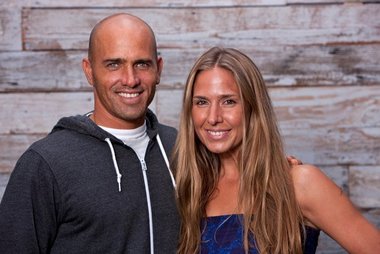
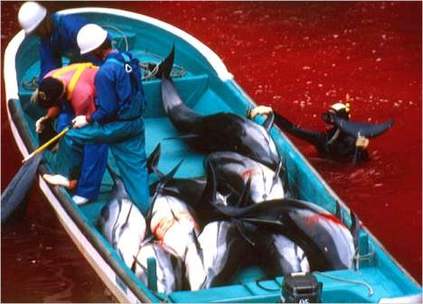
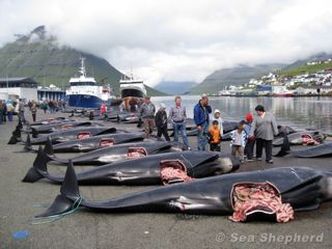
 RSS Feed
RSS Feed














